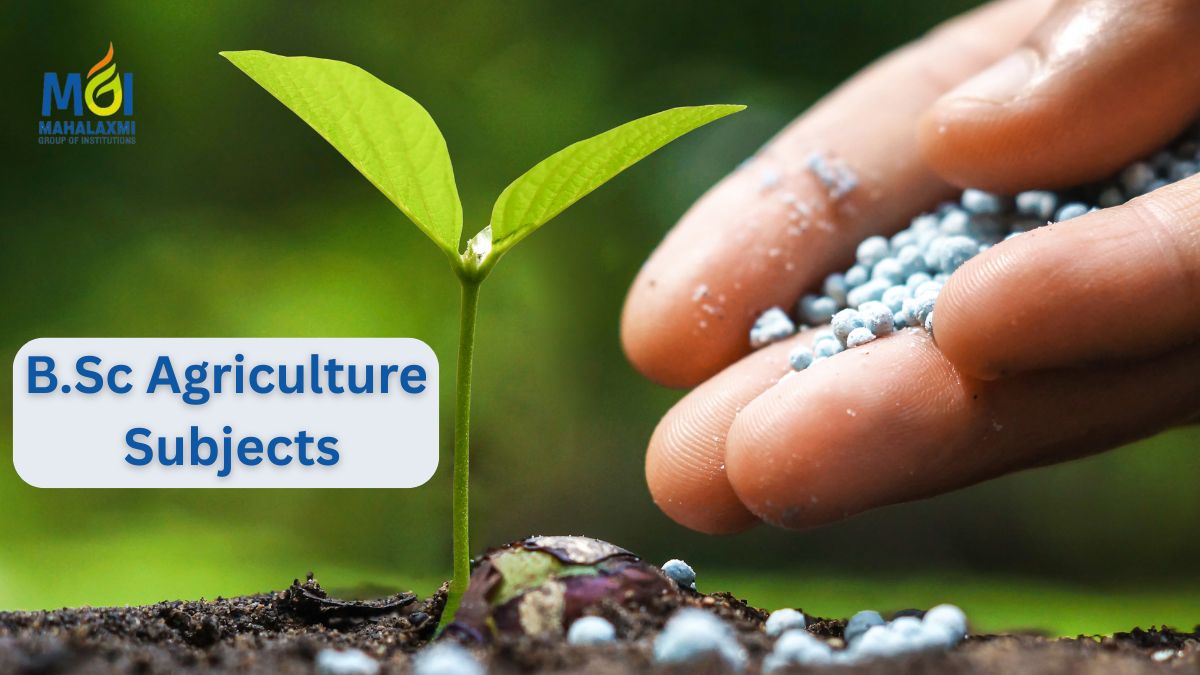B.Sc. (Home Science)
B.Sc Home Science is a 3 year full-time…

At MGI Meerut, students actually perform crop growth trials, soil testing, and visit real agro-industries. Are you planning to build a career in farming and food production? Knowing the BSc Agriculture subjects helps you prepare well. This course blends science with practical learning.
At MGI Meerut, we guide students through every core and optional subject. You will study crops, soil, farm technology, and many other topics.
The B.Sc. agricultural program is a 4-year bachelor's degree. It focuses on improving farming through science. Students learn about plants, soil, water, and modern equipment.
This course covers theory and fieldwork. It suits students who completed 12th with PCB, PCM, or Agriculture.
In India, the B.Sc. The agriculture syllabus is designed in accordance with the guidelines of the Indian Council of Agricultural Research (ICAR). In 2026, ICAR strengthened the syllabus under the NEP 2020 framework with a strong focus on practical learning.
Key 2026 Updates:
This update makes students job-ready and industry-oriented.
Here are some main BSc Agriculture subjects covered during the 4 years:
Sem 1
Basics of farming (Agronomy)
Soil composition & nutrients
Intro to fruits & vegetables (Horticulture)
Sem 2
How crops grow (Crop Physiology)
Useful + harmful microbes in farming (Microbiology)
Water use & irrigation methods
Sem 3
Insects affecting crops (Entomology)
Improving crop varieties (Plant Breeding)
Controlling unwanted plants (Weed Management)
Sem 4
Plant diseases & solutions (Plant Pathology)
Irrigation techniques & equipment
Basics of farm tools & machinery
Sem 5
Seed quality & production (Seed Technology)
Farm business & cost management (Agri Economics)
Working with farmers at the ground level (Extension Education)
Sem 6
Growing crops without chemicals (Organic Farming)
Poultry care & management
Dairy & livestock handling
On-field practical training
Sem 7–8
Full-time internship in villages (RAWEP)
Field research/project work.
Core Subjects (Compulsory)
Agronomy – Crop production methods, soil preparation, and yield improvement techniques.
Soil Science – Soil fertility, nutrients, and soil health management.
Horticulture – Cultivation of fruits, vegetables, flowers, and plantation crops.
Plant Pathology – Identification and control of plant diseases.
Entomology – Study of insects affecting crops and pest management.
Genetics & Plant Breeding – Crop improvement through breeding and genetics.
Elective Subjects (Optional)
Organic Farming – Chemical-free and sustainable farming practices.
Dairy Technology – Milk production, processing, and dairy farm management.
Post-Harvest Technology – Storage, processing, and quality control of farm produce.
Agri-Business Management – Farm business planning, marketing, and finance.
Sustainable Agriculture – Eco-friendly and climate-smart farming methods.
Food Processing – Processing, packaging, and value addition of agricultural products.
Semester 1: 20–22 academic credits
Semester 2: 20–22 academic credits
Semester 3: 22–24 academic credits
Semester 4: 22–24 academic credits
Semester 5: 24–26 academic credits
Semester 6: 24–26 academic credits
Semester 7: Mandatory internship and field training
Semester 8: Final research project and practical evaluation
Marks are awarded based on:
As per NEP 2020, B.Sc. Agriculture now follows a multi-exit system:
This allows students to continue or exit their education without losing academic value.
At MGI Meerut, students apply what they learn in the classroom to real-world fields. You perform soil tests, grow crops, and use farm machines. This BSc Agricultural subjects include laboratories and hands-on training in university fields. Learning in the classroom and on the field helps you handle the challenges of real-life cultivation with confidence.
In later semesters, students select subjects based on their interests. Some of these include:
These alternative topics allow you to shape your career path in a particular area.
Studying BSc Agriculture subjects develops practical and technical skills. You learn:
These skills are useful for jobs or starting an agricultural business.
After completing a BSc Agriculture, you can work in:
You can also study further in MSc Agriculture or MBA Agri-Business.
MGI Meerut is one of the trusted institutes for agricultural education. We offer:
We focus on turning students into agriculture professionals.
At MGI Meerut, students perform soil testing, seed germination practice, crop growth trials, and field machinery training.
A BSc in Agricultural subjects creates a strong foundation in farming and science. You achieve the risk of knowledge, skill, and the real world. This course offers vast career options, from jobs to entrepreneurship. If you dream of growing India’s future in agriculture, start your journey at MGI Meerut today.
Q1. Are the BSc agricultural subjects tough to study?
No. These subjects are easy to follow if you love science and nature. Teachers guide you with simple notes and practical examples.
Q2. Do I need to do fieldwork in this course?
Yes. Field training is an important part of the course. You gain hands-on experience in crop production and farm handling through real-time practice.
Q3. Can I get a job after learning these subjects?
Absolutely. You can enter public jobs, join research, work with agri firms, or launch your own farming business.
Santosh SEO
Blogger | Education Guide for Indian Students
Santosh writes simple, useful blogs for students. He helps them choose the right course at the right college with honest and clear advice.
